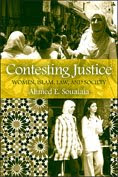by A. E. Souaiaia
by D. W. Aossey
From the manufactured hy steria surrounding Islamo-fascism to the election of the first Muslim to the U.S legislature, interest in “Islamic Law” - or Shari’ah - and its place in a broader social framework has recently surged. While those on opposite sides of many contemporary issues promote Shari’ah as a precise set of Islamic legal guidelines readily available to be rolled-out and implemented, much in the way of jurisprudence in the modern Muslim world has more to do with cultural norms and traditional social justice than anything arising from Koranic sources or scholarly Shari’ah. Add to the mix the subject of women rights and the issues only become more convoluted.
steria surrounding Islamo-fascism to the election of the first Muslim to the U.S legislature, interest in “Islamic Law” - or Shari’ah - and its place in a broader social framework has recently surged. While those on opposite sides of many contemporary issues promote Shari’ah as a precise set of Islamic legal guidelines readily available to be rolled-out and implemented, much in the way of jurisprudence in the modern Muslim world has more to do with cultural norms and traditional social justice than anything arising from Koranic sources or scholarly Shari’ah. Add to the mix the subject of women rights and the issues only become more convoluted.
A new book by Dr. Ahmed E. Souaiaia entitled Contesting Justice: Women, Islam, Law and Society, examines the subject of women’s rights within the framework of Islamic Law and arrives at some rather surprising conclusions. Of specific interest in this concise and well-written text are the controversial issues of polygamy and inheritance, institutions that have traditionally held women at a disadvantage in the Muslim world. Yet, in regard to the inequitable practice of both institutions the author’s conclusion stands clear: don’t blame Islam for the actions of Muslims.
Following precise legal arguments and careful critical analysis, Professor Souaiaia shows that the disparity regarding women’s rights in Muslim society is most notably rooted in the conflict between traditional social norms and the abandonment of the revolutionary reform first championed by the Koran and the sayings of the prophet Mohammad, or Sunnah. In the case of inheritance, for example, rules governing female apportionment are actually quite clear and in fact guaranteed, whereas those governing men are ambiguous. Surprisingly, through the interpretative processes though, this lack of specificity of males’ inheritance still favored men in traditionally elite dominated societies. In a careful analysis of the basis for polygamy under Islam, Professor Souaiaia likewise shows that monogamy is the only marital state sanctioned under Qur’anic Law. In other words, the author sees a disparity between Islamic law and Qur’anic law and he argues that, by the middle of the second Islamic century, the progressive Qur’anic reform was restricted by the tradition of the elite.
Though written from a legal perspective Contesting Justice is also intended for a general audience and certainly succeeds in getting key points and concepts across in an understandable manner. Numerous illustrative examples set this intriguing and informative text apart from others on Islamic legal theory and practice and overall does an excellent job of dispelling many of the negative myths and stereotypes behind the perception of gender inequity in Islam.
In Contesting Justice: Women, Islam, Law and Society, Dr. Souaiaia has created a comprehensive and compelling doctrine on women’s rights under Islam and an indispensable guide to this fascinating subject.
Also published in October 2008; Issue 16 of The Independent Monitor





No comments:
Post a Comment